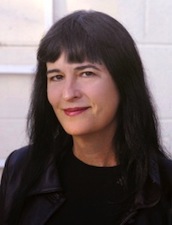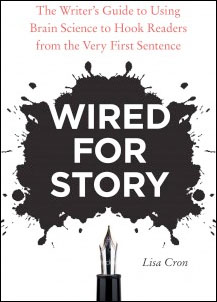Q and A No. 99! Who will be No. 100? As we wait for the 100th practitioner to be revealed and the revised compilation of Q&As to be assembled, I’m thrilled to present a Q&A with Lisa Cron. Lisa approached me about her book, Wired for Story, releasing the week this Q&A is published, and I suggested she do a Q&A to introduce readers to herself and her book. This Q&A will appear over several days.
 Bio: Lisa Cron spent a decade in publishing, first at W.W. Norton in New York, then at John Muir Publications in Santa Fe, NM, before turning to TV. She’s worked on shows for Fox, Bravo and Miramax, and has been supervising producer on shows for Court TV and Showtime. She’s been a story consultant for Warner Brothers and the William Morris Agency in NYC, and for Village Roadshow, Icon, The Don Buchwald Agency, and others in LA. She’s featured in Final Draft’s book, Ask The Pros: Screenwriting. Her personal essays have appeared on Freshyarn.com and the Huffington Post, and she has performed them at the 78th Street Playhouse in NYC, and in LA at Sit ‘n Spin, Spark!, Word-A-Rama, Word Nerd, and Melt in Your Mouth (a monthly personal essay series she co-produced). For years she’s worked one-on-one with writers, producers and agents developing book and movie projects. Lisa has also been a literary agent and for the past six years, an instructor in the UCLA Extension Writers’ Program, where she currently teaches. Her book, Wired for Story: The Writer’s Guide to Using Brain Science to Hook Readers from the Very First Sentence, will be published by Ten Speed Press on July 10.
Bio: Lisa Cron spent a decade in publishing, first at W.W. Norton in New York, then at John Muir Publications in Santa Fe, NM, before turning to TV. She’s worked on shows for Fox, Bravo and Miramax, and has been supervising producer on shows for Court TV and Showtime. She’s been a story consultant for Warner Brothers and the William Morris Agency in NYC, and for Village Roadshow, Icon, The Don Buchwald Agency, and others in LA. She’s featured in Final Draft’s book, Ask The Pros: Screenwriting. Her personal essays have appeared on Freshyarn.com and the Huffington Post, and she has performed them at the 78th Street Playhouse in NYC, and in LA at Sit ‘n Spin, Spark!, Word-A-Rama, Word Nerd, and Melt in Your Mouth (a monthly personal essay series she co-produced). For years she’s worked one-on-one with writers, producers and agents developing book and movie projects. Lisa has also been a literary agent and for the past six years, an instructor in the UCLA Extension Writers’ Program, where she currently teaches. Her book, Wired for Story: The Writer’s Guide to Using Brain Science to Hook Readers from the Very First Sentence, will be published by Ten Speed Press on July 10.
Q&A with Lisa Cron, Questions 1 and 2:
Q: What inspired you to write Wired for Story? In what ways did you see a need for writers to understand the neurological process of story?
A: No one was talking about this stuff. No one. I had students coming to my classes at UCLA who’d gotten MFAs from some of the country’s most prestigious universities yet they didn’t know the first thing about story. At first I was stunned. Then it dawned on me that most writing instruction centers on learning to “write well” rather than how to write a story. Big difference. I did a little research, and saw that while there were myriad writing books out there, none of them even touched on what I was teaching. I leapt in to fill that gap.
The reason it’s essential for writers to understand how the brain processes story is threefold. First, because it puts to rest the notion that story is something that lyrical writing can “transcend.” Second, because it allows writers to see how genuinely, profoundly powerful story is. Third, because understanding what the brain is hungry for in every story we hear allows writers to craft stories capable of captivating the audience from the very first sentence.
Q: How did you initially become involved with story/storytelling /narrative? What attracted you to this field? What do you love about it?
/narrative? What attracted you to this field? What do you love about it?
A: That’s like asking me when I became involved with breathing — who remembers, I just know I’ve been drawn to story. As a child I was enthralled with Rudyard Kipling’s Just So Stories, then Nancy Drew, then every movie ever made. When I was a teenager, my best friend and I would drive 100 miles to just see some obscure B movie at a drive-in. If it were compelling, I’d be so deeply drawn in that when we left the theater, it was a surprise to enter “the real world” again — and the story would stick with me.
Then I began to realize that the stories I saw were affecting how I saw the world. That got me interested in the nature of story itself. Turns out stories reach us in a way that facts can’t penetrate. Stories put facts into a context that allows us to experience how they would affect us. And in so doing, the stories themselves affect us — stories can literally rewire our brain, giving us more empathy, and more insight into how others see the world.
That’s why writers and storytellers are the most powerful people in the world. Story is my passion, there’s nothing I love more than working with people, helping them translate their vision into a story that not only reflects, but can help shape, reality.
